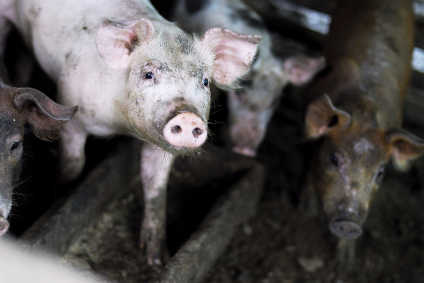
Hormel Foods expects to see profit margins and volumes come under further pressure in the second half of the year as input costs rise on the back of the African swine fever outbreak in China, which has already prompted the US-based food group to increase prices.
China is the world’s biggest producer and consumer of pork, and, according to industry estimates, between 150 million and 200 million hogs have been wiped out since African swine fever (ASF) first appeared in the country during the summer of last year. And the disease has since spread to parts of Europe.

Discover B2B Marketing That Performs
Combine business intelligence and editorial excellence to reach engaged professionals across 36 leading media platforms.
Hormel, which owns the Spam canned meat brand and Columbus craft meats, cut its sales and earnings per share outlook this week as the New York-listed firm felt the impact of the disease on its second-quarter results.
President and chief executive Jim Snee said in the earnings statement yesterday (23 May): “African swine fever in China started to impact global hog and pork markets this quarter, which led to rapidly increasing input costs. In response, we have announced pricing actions across our branded value-added portfolio in the Grocery Products, Refrigerated Foods and International segments.”
And on a post-results conference call, Snee said the number of hogs lost in China so far is the equivalent to “more than the entire pork production in the United States”, which is likely to “play a vital role in filling the global supply gap”. He said hog prices in China rose by around 28% during its fiscal second quarter as a result.
“As we look forward, the biggest unknown in the protein industry is related to the outbreak of African swine fever in China,” Snee added. However, domestic pork prices are likely to continue to rise due to the higher demand and a rise in exports, he said.

US Tariffs are shifting - will you react or anticipate?
Don’t let policy changes catch you off guard. Stay proactive with real-time data and expert analysis.
By GlobalDataHe continued: “The speed at which markets [pork] move can cause short-term margin expansion and compression as our prices lag input cost changes. The second quarter demonstrated this dynamic as near-term margins were pressured. We expect similar periods of margin pressure as markets move higher in the back half of 2019.”
And Snee also acknowledged that Hormel’s volumes may come under more pressure but the company is taking other actions to try and mitigate the ASF impact.
“We do expect short-term volume declines, but they will vary by category,” the CEO said. “We have taken proactive actions to maintain volumes such as adjusting our promotional activity, and shifting our advertising to support key brands.”
Nevertheless, Snee said it will likely be the latter half of the third quarter before Hormel’s pricing actions filter through to the retailer, which he added typically takes 30 to 75 days, depending on the product category. But within the company’s foodservice operation it is able to adjust prices every two weeks, “which allows us to stay closer to any market changes”.
US meat companies are becoming increasingly concerned over the ASF outbreak in China, although some processors are likely to benefit as they seek fill the supply gap.
Earlier in May, Tyson Foods said there is a risk the disease could reach America and has the “potential to impact the global protein industry on a level that we have never experienced”. And the company, like Hormel, said it could feel the impact from an increase in input costs for pork used in prepared foods.
Hormel’s chief financial officer Jim Sheehan, told analysts on the conference call that pork belly prices “have historically been the most volatile of our key inputs”. He expects those prices to rise by about 30% to 40% from current levels.





